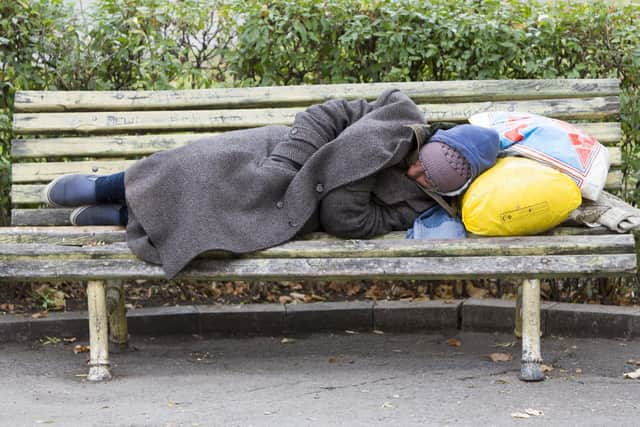Rough sleepers only the tip of the iceberg for homelessness problem in Bristol
and live on Freeview channel 276
A new study by a Bristol charity reveals that people sleeping rough on the streets is only the tip of the iceberg when it comes to the growing problem of homelessness and housing insecurity in the city.
The report by Early Doors, a partnership between homelessness charity Caring in Bristol and housing advice agency CHAS Bristol, highlights the fact that rough sleeping is the more visible side of people being classed as ‘homeless’. Other ‘red flags’ of homelessness include people who are sofa surfing; staying with friends or family; staying in a hostel, night shelter, B&B, women’s refuge or temporary private and social housing or squatting.
Advertisement
Hide AdAdvertisement
Hide AdOther situations that fit into the definition of homelessness and housing insecurity are people living in overcrowded accommodation or living in unsuitable accommodation such as ‘beds in sheds’ or vehicles without a parking right.
Between April 2021 and March 2022, a total of 3,119 households were assessed by Bristol City Council with 2,841 (87.9%) assessed as being either or threatened with homelessness.Out of them, 516 (16.5%) households were deemed as being threatened with homelessness within the next 56 days and so were owed a prevention duty.
Some 2,225 (71.3%) households were deemed as homeless, with many sofa surfing by living with friends or family. There were 378 people (12.1%) deemed as not being threatened with homelessness within 56 days and so no duty was owed.
Jessie Seal, Early Doors Project Manager and author of the report, said sofa surfing and staying with friends and family currently plays a large role in accommodating and preventing people who may otherwise be street homeless in Bristol.
Advertisement
Hide AdAdvertisement
Hide Ad“In Early Doors’ experience, sofa surfing and overcrowding are often experienced together and not fully understood by support agencies,” said Jessie.
“For example, a young person may say they are staying with a friend, but in reality this may involve staying on the floor of multiple acquaintances, having to arrive late at night and then leave early the following morning without somewhere to eat breakfast or shower.”


The report found that the largest group owed a prevention duty was as a result of the end of private rented tenancy (such as Section 21 eviction notices, the notice a landlord must give to end an assured shorthold tenancy), with 39.5% of households stating this as their reason for the loss of their last settled home.
Young people are also disproportionately experiencing homelessness in Bristol. Just under 17% of main applicants in Bristol for homelessness relief and prevention duties were 16-24 whilst 30.4% were 25-34 years old.
Comment Guidelines
National World encourages reader discussion on our stories. User feedback, insights and back-and-forth exchanges add a rich layer of context to reporting. Please review our Community Guidelines before commenting.
